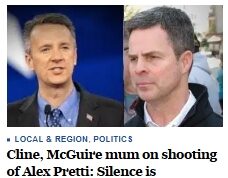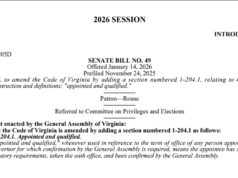| RICHMOND, VA — Given the increasing evidence of the impact cell phone and social media usage has on education and youth mental health, Governor Glenn Youngkin today issued Executive Order 33, which directs the Virginia Department of Education (VDOE) to draft guidance for public school divisions to adopt local policies and procedures establishing cell phone-free education.
The EO directs VDOE to initiate a robust public engagement effort with parents, students, teachers, local school leaders and other stakeholders to develop collaboratively policies and procedures that establish the age-appropriate restriction or elimination of cell phone use during instructional time, as well as to establish protocols allowing parents to contact their children in emergency and other important situations.
In addition, the Governor announced today that the VDOE and the Department of Behavioral Health and Development Services (DBDHS) will make a combined $500,000 available from existing funds to support implementation of this mental health and safety initiative.
“This essential action will promote a healthier and more focused educational environment where every child is free to learn. Creating cell phone and social media-free educational environments in Virginia’s K-12 education system will benefit students, parents, and educators,” said Governor Glenn Youngkin. “Today’s Executive Order both establishes the clear goal to protect the health and safety of our students by limiting the amount of time they are exposed to addictive cell phones and social media and eliminates clear distractions in the classroom. It also kicks off the robust conversations among parents, students, teachers, and school and community leaders necessary to design and implement these policies and procedures at the local level.”
Implementing cell phone-free education in Virginia’s K-12 public schools is critical, especially given youth chronic health conditions, such as depression and anxiety, that are driven in part by extensive social media and cell phone use. Children spend an average of 4.8 hours a day on social media, and recent studies indicate that spending more than three hours a day on social media doubles the risk of poor mental health for adolescents. Most alarming is the U.S. Center for Disease Control and Prevention data from 2019-2021, reporting that the rate of suicide has increased 167% since 2010 for girls and 91% since 2010 for boys. In the same timeframe, boys and girls experienced a spike in depression of 161% and 145%, respectively.
“The data is clear, and it is time for Virginians to come together to address the damage of social media and screens to healthy childhoods. Government cannot be the sole solution to this crisis; school communities – especially parents and teachers – must work together to discuss and develop common sense approaches to limit screen time, prioritize open channels of communication, and re-establish norms that reinforce healthy and vibrant learning communities,” said Secretary of Education Aimee Guidera.
“Many parents and teachers struggle to balance socializing and social media, play or learning time and screen time, and true human connection and internet connection,” said Secretary of Health and Human Resources Janet Kelly. “The more we learn, the more we know that too much screen time – especially time spent on addictive apps – is harmful to kids’ physical and mental health. A few weeks ago, the Surgeon General of the United States issued a formal advisory suggesting that tech companies be required to put a warning label on social media apps. Governor Youngkin’s Executive Order 33 complements that advisory well. Too many childhoods have ended because of the wild west of addictive apps, and it is time we work together to bring childhood back.”
The Executive Order directs VDOE to publish their draft guidance by August 15. After considering feedback from stakeholders, VDOE will issue final guidance in September for local school divisions to adopt cell phone-free education policies and procedures by January 1, 2025.
Nothing in this Executive Order is intended to prohibit school divisions from adopting age-appropriate policies and procedures ahead of this date or that are more comprehensive than the guidance issued by VDOE.
The Department of Education will facilitate listening sessions and other stakeholder engagement opportunities over the next six weeks to solicit public input on this policy, gather feedback on best practices currently underway in Virginia public schools, and receive input for the draft guidance establishing cell phone-free education in K-12 public schools.
“Cell phones and digital media have caused pre-teens and teens to disconnect from the real world, have increased mental health challenges, and have caused significant disruption in the important daily learning opportunities in their classrooms,” said Superintendent of Public Instruction Lisa Coons. “Parents and teachers understand the importance of creating cell phone-free education in our schools so that students can focus on instruction and learning during the school day. We look forward to facilitating conversations around the danger to our children of cell phones, social media, and the impact of screen time and will focus on creating guidance that protects the health and safety of our students.”
Funding from VDOE and DBDHS will support state and local efforts to facilitate family nights and community engagement on the youth mental health crisis and cell phone use best practices as well as enable school divisions in need of assistance to receive microgrants to help implement best practices in their local community. As part of the Back-to-School Season, there will be a series of Commonwealth Conversations across Virginia to provide opportunities for discussion on how schools and communities can build new norms around phone usage.
While some school divisions in Virginia have already implemented cell phone limitation protocols, this Executive Order is the first statewide effort to enhance the learning environment by eliminating or severely restricting cell phone devices during instructional time. Recent studies indicate that students who use their phones during class learn less, achieve lower grades, and can face a cumulative, lasting, and detrimental impact on their ability to focus and engage in their studies.
Learn more about ways to engage and provide input here. |




![As “Despicable Toady for Trump” JD Vance Rants About Virginia Redistricting and How “In the [USA], you don’t have to apologize for being white anymore,” Glenn Youngkin Says Vance Would Be a “Great” 2028 GOP Presidential Nominee](https://bluevirginia.us/wp-content/uploads/2026/01/youngkinvancemontage-238x178.jpg)





![[UPDATED 1/29/26] Audio: Sen. Tim Kaine Talks to Blue Virginia About His “Five-Point Plan” to Fight Trump’s Orban-Like Assault on US Democracy; Civil Disobedience a la MLK Jr.; Trump’s Bogus “Energy Emergency”; the Crucial Importance of the 2025 VA Elections; etc.](https://bluevirginia.us/wp-content/uploads/2025/02/kaineinterview2-100x75.jpg)
